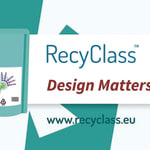
Reversing the status quo in the waste management practices of plastic packaging by making them recyclable remains one of the key challenges. The EU made it clear: all plastic must be recyclable and reusable by 2030. That is why we need to act now to genuinely transform the packaging market.
The transformation needs to begin with increased value of waste, via applying the design for recycling principles. Every product placed on the market should be designed in a way that considers its end of life stage, making it compatible with recycling technologies.
This is the drive behind the RecyClass Platform which gathers the entire plastics value chain, including raw material producers, converters, brand owners, recyclers and waste management specialists, for whom recyclability is at the core of the sustainability strategy. They work together on advancing recyclability and the progress towards a circular economy for plastic packaging.

One of the main activities of the Platform is elaborating scientifically based recyclability guidelines which are based on the Recyclability Evaluation Protocols. The Protocols propose a standard methodology to assess and evaluate the behaviour of a packaging or innovative technology throughout a state-of-art recycling process in a quantitative, calculable manner. This is crucial in encouraging innovations which optimize the recycling processes, and at the same time verify their success in doing so. The findings of such tests are the basis for continuous updates of the Design for Recycling Guidelines, accounting for the latest technologies on the market. The Guidelines, consequently, consider the specifications of each packaging type and polymer to determine whether it can be awarded “full compatibility,” “limited compatibility” or “no / low compatibility.”
The Recyclability Evaluation Protocols and the Guidelines, in turn, are used as the back end of the self-assessment, online RecyClass tool. This tool evaluates qualitatively the level of recyclability of a package. At the end of such an analysis, a product under the evaluation is awarded a class that demonstrates its full (class A), partial or no recyclability (class F). Beyond this assessment, RecyClass guides users on how to improve critical design aspects for compatibility with recycling processes.
Based on these documents and the underlying recyclability methodology, certifications for both the qualitative and quantitative assessment of final products are elaborated. To allow for maximum transparency and impartiality, these Certifications are performed by accredited Certification Bodies and independent auditors. By guaranteeing in a verified manner recyclability, they drive the harmonization and transparency across the market, building trust among the industry, as well as consumers.
Any company looking into assessing its plastic packaging can reach out at www.recyclass.eu



